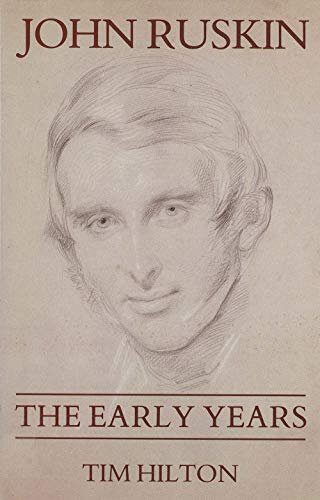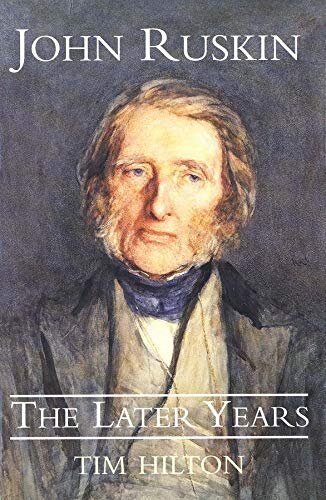Selected Writings of John Ruskin
While our website features pdfs of the thirty-nine volumes of landmark Library Edition of the Works of John Ruskin, courtesy of Lancaster University and its Ruskin Library, most readers interested in Ruskin, past and present, will gravitate, at least initially, to the many less daunting samplings of passages and quotes from Ruskin’s works. These often suffer from the drawbacks of such collections -- collages of favorite quotations assembled with little or no attention to context. The list below is a sampling of the very best and most useful of the modern Ruskin anthologies, ones which provide both generous excerpts from Ruskin’s writings and helpful background materials.
Rosenberg, John D., ed. The Genius of John Ruskin: Selections from His Writings. Published 1963; 566 pp.; 1998 reprint, University of Virginia Press ISBN 0813917891
First published in 1963, John D. Rosenberg’s The Genius of John Ruskin aimed to make Ruskin’s ideas and writings accessible to the modern reader and it quickly became a classic. Long out of print, this essential anthology is now available from the University of Virginia Press with a new foreword by Herbert F. Tucker and an expanded and updated bibliography by the editor that takes into account recent Ruskin scholarship. One of the collection’s particular strengths is its sampling of excerpts in chronological order from all the periods of Ruskin’s writing life.
Wilmer, Clive, ed. Unto This Last and Other Writings by John Ruskin. Introduction by Clive Wilmer/Notes by Clive Wilmer, 1986. 368 pp. Penguin Classics ISBN 9780140432114
Centered on Ruskin’s Unto This Last, a closely argued assault on the science of political economy, this volume of artful selections from Ruskin’s works shows the astonishing range of his intelligence. An illuminating introduction by Wilmer, the former Master of Guild of St. George, Ruskin’s charity founded in 1871 (and still going strong), reveals the consistency of Ruskin’s philosophy and his adamant belief that questions of economics, art, and science cannot be separated from questions of morality.
Other worthwhile anthologies, now out of print but still available online or used, include:
Kenneth Clark, ed. Ruskin Today: A Selection (1964) Penguin ISBN-10: 0140550380
Joan Evans, ed. The Lamp of Beauty: Writings on Art by John Ruskin, Phaidon Press (1959) reprint Cornell University Press (1980) ISBN-13: 9780801491979
Rose Porter, ed. Nature Studies: Selections from the Writings of John Ruskin, Dana Estes & Company, Boston (1900)
The Ruskin Compendium
Prof. Jim Spates (emeritus professor of sociology at Hobart William Smith Colleges in Geneva, NY) has compiled this unique and comprehensive list of Ruskin anthologies. To access click here, and for more from this source, visit his blog.
Biographical Studies
There are dozens of useful and interesting biographies and biographical studies of Ruskin, many published in recent years. This list is an attempt to refer readers, especially those newly interested in Ruskin, to the essential works.
Rosenberg, John D. “The Darkening Glass: A Portrait of Ruskin’s Genius,” (1961), reprint 1986, Columbia University Press, 274 pp. ISBN 0231063873.
This landmark study, both biography and literary criticism, has never been surpassed for the breadth of its interpretation of Ruskin’s achievement -- an interpretation that reveals the fundamental unity of his insights, the core of consistency even in his contradictions. It is also a sympathetic portrait of Ruskin himself, portraying him in all his sensitivity, courage, nobility and tragic torment. An essential book; the best of introductions.
Leon, Derrick. Ruskin: The Great Victorian (1949), Routledge & Kegan Paul, London. 595 pp.
Though published more than seventy years ago, Derrick Leon’s comprehensive biography remains, overall, the most satisfying. The author of studies of Proust and Tolstoy, Leon died of tuberculosis at age 36 in 1944, leaving his brother to edit his great manuscript on Ruskin. Based on extensive research in Ruskin’s then-unpublished correspondence, Leon’s work illumines not only the character of Ruskin’s achievement, including one of the best treatments of Ruskin’s aesthetic philosophy, but on the personal tragedy and thwarted love that haunted Ruskin’s life and, in his final decade, silenced him.
Hilton, Tim. John Ruskin: The Early Years (1819-1859), 1985, Yale University Press, 301 pp. ISBN 0-300-03298-6, John Ruskin: The Later Years (1859-1900), 2000, Yale University Press, 656 pp. ISBN 0-300-08311-4
Hilton’s two-volume biography of Ruskin is widely considered to be the authoritative Ruskin biography of our time. At nearly a thousand pages, it is certainly the most thorough source of biographical information in print and a symbol of the revival of Ruskin’s reputation as a magisterial thinker, the most eloquent and radical of the Victorian sages. While well-informed and comprehensive in its treatment of the events of Ruskin’s life and of the world in which he lived, occasional lapses in judgment mar what otherwise might have been the definitive “life.”
Collingwood, William Gershom (W.G.). The Life and Work of John Ruskin. Two volumes, 1893. Methuen, London. (i) 243 pp. (ii) 285 pp. Reprint Kessinger Publishing 2004. 592 pp. ISBN 1417948264, 9781417948260
W.G. Collingwood became a student of John Ruskin in 1872 while he was enrolled in University College, Oxford. Later on, Collingwood served as Ruskin’s resident assistant until Ruskin’s death in 1900. In 1893, Collingwood published his The Life and Work of John Ruskin in two volumes and in 1900 a shortened and thoroughly updated version. Collingwood’s study reflects all the virtues of close personal association with its subject and an editor’s thorough familiarity and identification with Ruskin’s works and thought. After more than a century, it remains an indispensable source.








